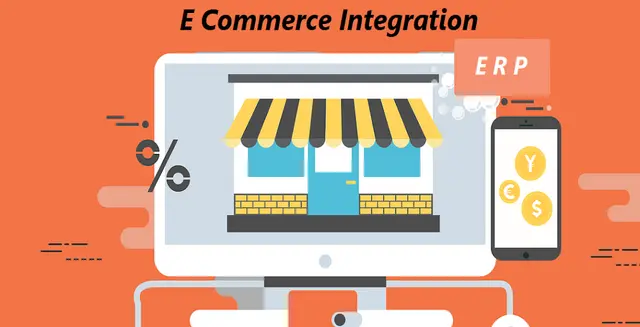eCommerce integration is crucial for companies looking to improve consumer experiences and optimize operations in the modern digital environment. However, what exactly is eCommerce integration, and why is it so important to your company? This blog will examine the idea, go over its advantages, point out any potential drawbacks, and offer advice on how to successfully integrate your eCommerce company.
What is eCommerce Integration?
The process of integrating your eCommerce platform with other internal corporate systems and apps is known as eCommerce integration. Integrations with accounting software, customer relationship management (CRM), inventory management, and other programs can fall under this category. eCommerce integration enables improved administration and coordination of diverse business processes by synchronizing different systems and facilitating a smooth information flow.
API eCommerce integration heavily relies on eCommerce or application programming interface eCommerce. By enabling communication between various software programs, APIs make it easier for data to move between systems. This automation lowers errors, cuts down on human labor, and makes sure that every aspect of your company is operating as a whole.
What Are the Benefits?

Improved Efficiency
Increased productivity is one of the main advantages of integrating eCommerce. You can avoid the requirement for labor-intensive and error-prone manual data entry by automating data transfer between systems. Your team will be able to concentrate on more strategic work as a result of this efficiency, which will increase output.
Better Inventory Management
Real-time inventory level updates are provided by eCommerce integration, guaranteeing that the information you have about your stock is always correct. By preventing stockouts and overstock scenarios, this visibility improves inventory management and lowers carrying costs.
Enhanced Customer Experience
Customers have a more smooth purchasing experience when systems are connected. They have instant access to data on product availability, order progress, and delivery schedules. Increased client satisfaction and loyalty result from this transparency, which also fosters repeat business.
Streamlined Order Processing
The order processing procedure is streamlined by integrating your eCommerce platform with order management and fulfillment solutions. Orders are automatically forwarded to the relevant departments, cutting down on delays and guaranteeing delivery on time. This effectiveness can raise your order fulfillment percentage considerably.
Data-Driven Insights
By combining data from multiple sources, integrated systems enable you to get a thorough understanding of your company's performance. These data-driven insights support better decision-making, trend identification, and operational optimization.
What Are the Obstacles?

Technical Complexity
Technical complexity in eCommerce integration can necessitate knowledge of multiple systems and APIs. For companies without in-house technological resources, the integration process may require a great deal of customization and configuration.
High Initial Costs
eCommerce integration can come with hefty upfront expenditures, particularly if you have to hire outside experts or make an investment in new software. These expenses could be prohibitive for small companies with tight resources.
Data Security Concerns
The difficulty of data security rises with the integration of multiple systems. Steady security measures and continuous monitoring are necessary to guarantee secure data transfers across systems and prevent intrusions.
Compatibility Issues
The incompatibility of various systems might be a considerable obstacle when integrating them. It can take a lot of time and testing to find compatible software and make sure that systems communicate with each other smoothly.
Why Do You Need eCommerce Integration?
Businesses wanting to remain competitive in the digital marketplace must integrate eCommerce. You may improve client experiences, increase operational efficiency, and obtain insightful knowledge about your company by incorporating your systems. Having integrated systems can offer you a major competitive advantage over rivals still handling their operations manually in today's fast-paced commercial world.
Additionally, as your company expands, so will the amount of data it generates and the complexity of its operations. With eCommerce integration, you can grow your business without sacrificing accuracy or efficiency. To ensure long-term success and sustainability, it also enables you to react swiftly to changes in the market and client expectations.
How Do You Integrate Your eCommerce Business?

Choose the Right Systems
Choose systems that are interoperable and fit your needs as a business first. Examine aspects including each system's unique features, ease of integration, and scalability.
Plan Your Integration Strategy
Create a thorough integration strategy that specifies the objectives, schedules, and materials needed for the integration procedure. A roadmap for every step of the integration should be included in this plan, along with a list of probable problems and their fixes.
Leverage APIs
To enable smooth system communication, make use of APIs. Ensure the systems you've selected offer strong API support and that the people on your team are qualified to set up and oversee these integrations.
Test Thoroughly
To make sure that all systems are correctly integrated and that data moves between them without any problems, thoroughly test the system. Testing minimizes interruptions to your business by helping to find and fix any problems before the integration goes live.
Monitor and Optimize
After integration is finished, keep an eye on your integrated systems' performance at all times. Review customer input, system performance, and data accuracy regularly to find areas for improvement and adjust your operations.
Conclusion
In conclusion, you can completely change the way your organization operates by grasping the concept of eCommerce integration and putting it into practice. eCommerce integration has many advantages, including increased productivity, better inventory control, better customer service, expedited order processing, and data-driven insights. It's crucial to be mindful of potential roadblocks, too, such as compatibility problems, large upfront expenditures, technological complexity, and worries about data security. Check out our blog post, "20 Best E-commerce Business Ideas To Get Started," if you're prepared to launch your e-commerce venture.

